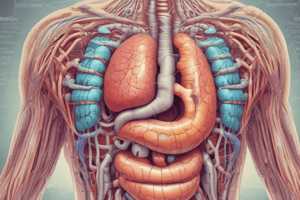Podcast
Questions and Answers
What is a common sign of bowel perforation?
What is a common sign of bowel perforation?
- High fever
- Frequent loose stools
- Tender board-like abdomen (correct)
- Severe pain in the lower abdomen
Which symptom is typically associated with bowel obstruction?
Which symptom is typically associated with bowel obstruction?
- Excessive thirst
- Severe abdominal pain and vomiting (correct)
- Rapid weight gain
- Clear urination
How do proton pump inhibitors (PPIs) work?
How do proton pump inhibitors (PPIs) work?
- They increase gastric acid secretion
- They neutralize existing stomach acid
- They block the enzyme that produces stomach acid (correct)
- They promote the production of mucous in the stomach
Which surgical procedure is associated with dumping syndrome?
Which surgical procedure is associated with dumping syndrome?
What is a potential complication of peristomal skin integrity?
What is a potential complication of peristomal skin integrity?
Which symptom is most commonly associated with gastric ulcers?
Which symptom is most commonly associated with gastric ulcers?
What is the primary complication of Crohn's disease related to nutrient absorption?
What is the primary complication of Crohn's disease related to nutrient absorption?
Which dietary recommendation is appropriate for managing ulcerative colitis?
Which dietary recommendation is appropriate for managing ulcerative colitis?
Which treatment option is part of the quadruple therapy for H. pylori?
Which treatment option is part of the quadruple therapy for H. pylori?
What symptom is characteristic of toxic megacolon in ulcerative colitis?
What symptom is characteristic of toxic megacolon in ulcerative colitis?
What is a major risk factor for H. pylori transmission?
What is a major risk factor for H. pylori transmission?
Which of the following describes a common symptom of Crohn's disease?
Which of the following describes a common symptom of Crohn's disease?
What indicates an emergency situation in patients with ulcerative colitis?
What indicates an emergency situation in patients with ulcerative colitis?
What is the expected color of a healthy stoma post-operatively?
What is the expected color of a healthy stoma post-operatively?
Which symptom is highly characteristic of ulcerative colitis?
Which symptom is highly characteristic of ulcerative colitis?
Flashcards are hidden until you start studying
Study Notes
Bowel Perfusion
- Severe upper abdominal pain may radiate to the shoulder.
- Symptoms include vomiting, collapse, tender board-like abdomen, loss of bowel sounds, and signs of shock.
Ileostomy Complications
- An ileostomy is a surgical opening into the ileum for fecal drainage.
- Bowel obstruction symptoms: abdominal pain, vomiting, bloating, inability to pass gas.
- Peristomal skin can be irritated due to allergic reactions, chemical irritation, mechanical injury, or infection.
- Additional symptoms include: dehydration, necrosis, and irritation.
Peptic Ulcer Disease (PUD)
- Symptoms: dull gnawing or burning mid-epigastric pain, heartburn, and vomiting.
- Treatment includes medications, lifestyle modifications, and possible surgery:
- Antibiotics + PPIs + bismuth salts for H. pylori eradication over 10-14 days.
- H2 receptor antagonists for NSAID-induced ulcers (e.g., cimetidine, famotidine).
- PPIs such as esomeprazole, omeprazole, pantoprazole, and rabeprazole.
- Lifestyle changes: avoid extreme food temperatures, alcohol, coffee, eat regular meals, and avoid painful foods.
- Surgical options include vagotomy, pyloroplasty, antrectomy (Billroth 1 & 2).
Impact of H. pylori
- Transmission occurs orally; more common in O+ blood types and familial settings.
- Treatment consists of antibiotic regimens with PPIs and bismuth salts to suppress or eliminate H. pylori.
- Quadruple therapy includes bismuth, tetracycline, metronidazole, and a PPI.
Crohn's Disease Symptoms and Complications
- Symptoms: worsening disease with unrelieved diarrhea, abdominal tenderness, RLQ cramping, ulcers, fever, and leukocytosis.
- Extraintestinal symptoms may include arthritis, skin lesions, and eye issues.
- Complications: intestinal obstruction, perianal disease, malnutrition due to malabsorption, and fistulas.
Ulcerative Colitis
- Main symptoms: diarrhea with mucus/blood, LLQ pain, rectal bleeding, fatigue, and cramping.
- Severe complications: toxic megacolon, perforation, and severe bleeding.
- Treatment may require total colectomy and ileostomy if unresponsive to other interventions.
- Diet recommendations: low fiber, high protein, high-calorie, with avoidance of milk, caffeine, and alcohol.
Postoperative Stoma Care
- Early ambulation is essential post-surgery.
- Stoma should appear pink to bright red and shiny.
- Monitor fecal drainage: ileostomy typically starts within 24-48 hours; colostomy within 3-6 days post-surgery.
- Reassess stoma at 3 weeks post-surgery; final appliance type determined 3 months after surgery once weight stabilizes.
Studying That Suits You
Use AI to generate personalized quizzes and flashcards to suit your learning preferences.




